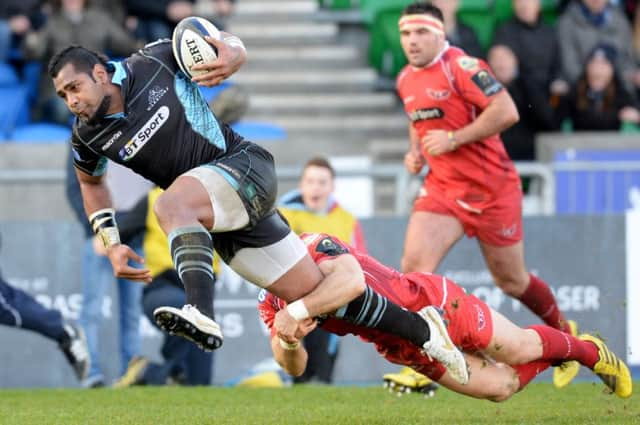Allan Massie: Recruits have Glasgow up and running


It’s no wonder if Lee Jones, a fast and skilful, but much smaller, wing may see his future in the Sevens game, especially since he must have a good chance of making the Great Britain Olympic squad next summer, though, between his globe-trotting with Scotland Sevens, he is on the bench for the return Scarlets game today. It’s worth remarking that there is still a place in rugby for the light and quick-footed wing. Even after Jonah Lomu showed how power allied to pace could be devastating, Shane Williams and Vincent Clerc scored lots of tries for both club and country.
Still Naiyaravoro is obviously a wonderful signing for Glasgow; nobody is going to enjoy lining up against him. The Italian flanker Simone Favaro is another fine recruit, a player who evidently loves tackling. When Niko Matawalu, DTH van der Merwe and Sean Maitland all moved on at the end of last season, one wondered how Gregor Townsend would replace them. Naiyaravoro and Favaro go some way to answering that question.
Advertisement
Hide AdAdvertisement
Hide AdTownsend’s invitation to Mike Blair to return to Scotland looks every bit as astute. Blair has played for Brive and Newcastle in the three years since he retired from international rugby, and the original suggestion seemed to be that his role at Scotstoun would be as much that of a mentor of young scrum-halves as a player. The injury to Henry Pyrgos changed things, and his form has made him, for the moment anyway, the first choice No 9. He ran the show for the hour he was on the field against the Scarlets. Always among the most intelligent of scrum-halves, he looked every bit as good as in his Scotland days. One has the impression that, for the first time since Andy Robinson and Rob Moffat were coaching Edinburgh, he is in a team whose style suits him perfectly.
Glasgow may still suffer the consequences of their first half against Northampton when they were overwhelmed up front and, to qualify for the quarter-finals of the European Cup, they will probably need more four-try bonus points as well as victories, but at last their season seems to be properly underway.
Elsewhere, the highlight of last weekend’s round of matches was Ulster’s remarkable demolition of Toulouse. Admittedly I can’t recall ever seeing Toulouse play quite as badly as they did in Belfast, and their former All Black fly-half Luke McAllister had the sort of game that players of his quality usually only experience in, one supposes, nightmares. Nevertheless Ulster were quite outstanding. Ruan Pienaar was rightly named as Man of the Match, but I was even more impressed by the quality of fly half Paddy Jackson’s passing. Ulster now look the only Irish side good enough to reach the quarter-finals. Leinster are definitely out of it, and Munster lost to Leicester at Thomond Park, conceding two soft tries that one couldn’t imagine the old Munster leaking in their Limerick fortress.
Down south Eddie Jones is evidently preparing to put his stamp on the England team. If he is indeed, as speculation has it, intending to give the captaincy to Dylan Hartley, this would certainly mark an abrupt departure from the principles of the Stuart Lancaster years. Whatever Hartley’s qualities as a player, he is a serial offender, guilty at different times of gouging, biting, head-butting and stamping. Lancaster wanted his team to connect with the public and to be admired and loved. If Jones indeed makes Hartley captain, it will be a sign that he doesn’t give a damn about all that. Whether the high heid-yins at Twickenham approve is probably irrelevant.
For the moment at least Jones is the man in charge, given a free hand. His decisions won’t be challenged unless his team loses matches. As ever with an England coach, his main problem will be selection. There are probably more players of international class in England than in Scotland, Wales and Ireland put together. His experience and success with Japan is hardly relevant.
Meanwhile the club-v-country question has been raised by Bristol’s reluctance to release Steve Borthwick, whom Jones wants as his forwards coach. Given how little time coaches have with players before and during the Six Nations, one would have thought compromise possible and indeed sensible. After all Matt Taylor doubles successfully as defence coach with both Glasgow and Scotland.